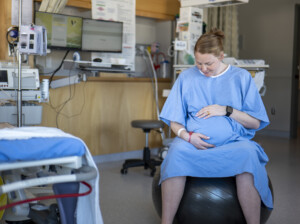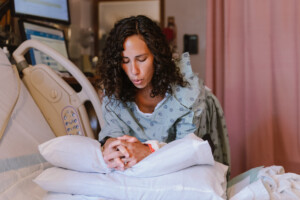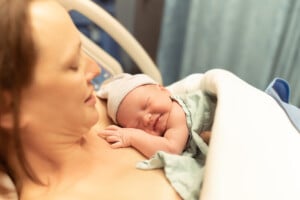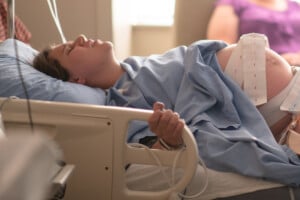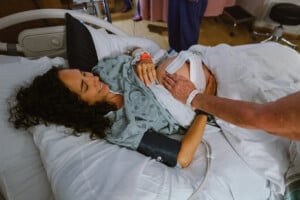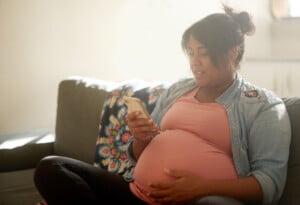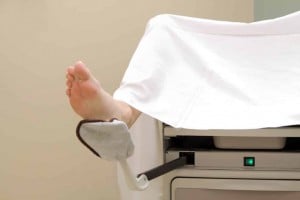Imagine exercising for 12 hours and being unable to eat or drink anything. That is what labor has been like in our recent history. As you prepare for labor and birth, you may wonder whether eating and drinking are safe during childbirth. Many hospitals do not allow food during active labor, but you can usually have fluids to drink. But why can’t you eat during labor, and why can’t you drink during labor?
Let’s explore the history of food and fluids in labor and the latest research and guidelines. Spoiler alert! Hospital and provider policies often differ from what the studies say. Talking with your doctor or midwife about eating and drinking during labor is essential.
History Lesson: Why You Can’t Eat During Labor
Traditional medical practice was to restrict food and drink during labor, thinking that food or fluids could cause vomiting, leading to aspiration. In this condition, a woman inhales food or liquid into the lungs. Aspiration has many serious complications, including lung disease and death.1
“Nothing by mouth” or NPO policies started in the 1940s when childbirth practices were quite different from today. Twilight sleep was common. Doctors gave women a combination of anesthetic medications. The doctor then delivered babies using an episiotomy and forceps. The mother would have no memory of giving birth. Aspiration was common for both vaginal and Cesarean deliveries. Doctors determined that aspiration was preventable by giving IV fluids, which is why you can’t eat during labor.1,2,7
What Does Modern Research Say About Why You Can’t Eat During Labor?
Much has changed in anesthesia and childbirth practices since the early 1900s. You are no longer given general anesthesia for childbirth except for emergency Cesarean births. Regional anesthetics such as epidurals and spinal anesthesia are used today for labor and most Cesarean births. You get to be awake, meet your baby the minute he is born, and remember all the incredible (and not-so-incredible) details.
Modern research includes dozens of studies about eating and drinking in labor. Studies done in the past few years show the following:
Restricting Food and Drink During Labor May Not Be Necessary
Research on aspiration rates during labor shows that it is incredibly rare. A study in the United Kingdom allowed people to eat and drink in labor, and results showed one death from aspiration out of more than six million births. There was only one patient with aspiration related to labor and delivery in the United States between 2005 and 2013.2,3,5,7
There are No Clear Benefits or Harms to the Mother or Baby
Although the studies found no clear harm, none considered a woman’s preference for eating and drinking in labor. The studies did not examine the harmful emotional impact withholding fluids and food can have. A woman’s satisfaction with her birth experience is a factor to consider.3,4
Eating and Drinking During Labor Does Not Increase Vomiting
The ugly truth is that a lot of women vomit in labor. The good news is that eating solid foods and drinking fluids will not make it worse.4
High-Risk Patients May Need to Avoid Solid Foods
High-risk patients include people with diabetes, obese women, or mothers having twins (or triplets). Solid food is more dangerous than clear fluids, but the risk remains low. We now have better general anesthetic techniques and decreased use of general anesthesia. But if aspiration happens, it is a severe event.5
Women with Low-Risk Pregnancies Who are Allowed to Eat May Have Shorter Labor
An extensive review of 10 studies found that women who eat and drink in labor have shorter labors by an average of 16 minutes. That is a slight difference, but anyone in labor would love to cut off as much time as possible. Some research indicates it could shorten labor by up to two hours.4,5
Eating Small but Frequent Amounts of Food Provides Calories and Energy During Labor
Little information is available about how much food and water is needed during labor, but the energy required for labor is compared to that required to run a marathon! Most women get IV fluid hydration in labor, and while some hospitals use a fluid containing a type of sugar, many do not. IV fluids make moving around in labor more complex and can cause fluid overload. IV fluids also do not ensure the right balance of nutrients and fluids to handle labor.3,6
What are Official Recommendations on Whether You Can Eat During Labor?
Medical professionals, such as ob-gyn doctors, anesthesiologists, and nurse-midwives, keep up to date on current research and make recommendations regarding what is best. There are several recommendations on whether you can eat or drink during labor.
The American Society of Anesthesiology (ASA) has stated that “most healthy people would benefit from a light meal in labor.” 5
The American College of Obstetricians and Gynecologists (ACOG) recommends women in labor may not need continuous IV fluids. Oral hydration can be encouraged. But they do not recommend solid food in labor stating the risk of aspiration.8
The American College of Nurse-Midwives (ACNM) has guidelines about eating and drinking in labor. It states that midwives should discuss the risk of aspiration with mothers. Midwives should “promote self-determination by healthy women experiencing normal labors concerning oral intake.” Midwives should check all women for the risk of complicated delivery or increased risk for aspiration.9
As you can see, there needs to be more agreement among professional organizations. The guidelines also need to follow what the science says. A deep fear of aspiration continues despite research indicating the incredibly low risk. Because of that, you will see a range of practices about what laboring women can eat and drink.
Can You Eat During Labor?
So, what’s the bottom line on whether you can eat during labor? The answer is a resounding “maybe.” I recommend that you discuss your desires with your doctor or midwife. Every provider has a different viewpoint. If you give birth at home or at a birth center, you most likely can eat and drink whatever you want.
It is hard to know before labor what you will want. Some moms like to eat all the way through. Often as contractions become more intense, the desire to eat decreases. The key is to listen to your body. If you feel like eating, you need nutrients and calories. If you are throwing up, eating won’t be appealing.
If you are considered “high-risk,” you will most likely not be able to eat. High-risk conditions include multiple babies, a planned Cesarean birth, a previous Cesarean birth, severe obesity, pre-eclampsia, or if you have diabetes.
Sometimes you are allowed food before you have an epidural. Once you have an epidural, only ice chips or sips of water. Your provider will ask you to stop eating if there is any concern about your baby’s heart rate or if you have complications.
Can You Drink During Labor?
You will likely be allowed to drink clear fluids in labor wherever you give birth. Clear fluids are anything you drink that you can see through. These include water, juice, tea, black coffee, and soda.
In certain situations, even clear fluids may not be allowed. If you have a planned Cesarean birth, you cannot eat or drink for several hours before surgery. Your doctor or midwife may ask you to stop drinking fluids if there is a complication or your baby is not tolerating labor. Your provider is probably concerned that you will need a Cesarean birth.
A Midwife’s Perspective
I have been a practicing nurse midwife for over 22 years. I have seen hospital and provider practices slowly shift to allow women to drink during labor and often eat. Every woman’s labor experience is different, and each person has other risk factors to consider. What works for one mother may not work for another.
For healthy women in normal labor, I see many benefits in encouraging women to eat and drink as they feel like it. It’s essential to push fluids. Adequate nutrition and hydration prevent a woman’s body from using fat for energy. When fat is used for energy, acidity develops in the blood of the mother and infant. Insufficient calories can make the uterus not function as well as it should, leading to prolonged labor. Being hungry also causes emotional stress. When a mother is stressed, her body does not work as it should, and labor can slow down.5
Women’s bodies are amazing. If you listen to your body, you will do what is best for you. Women that eat appear to have more energy, especially at the end of labor when they use a lot of energy to push out their babies.
If you can’t eat during labor, ensure you have access to a large meal after delivery because you will be ravenous! However, getting food can be challenging in the middle of the night, so have a plan.
Food and Drink Ideas for Labor
I recommend bringing food to the hospital if you plan to eat during labor. Getting the food you want can be difficult and even impossible. The best foods are easy to digest. Avoid heavy foods such as meat and pizza. Remember, you may see anything you eat again if you throw up. Here is a list of food and beverages I’d recommend packing for labor if you can eat:
- Fruits and vegetables
- Bread or crackers
- Soup
- Yogurt
- Energy bars
- Cereal
- Light sandwich
- Pasta salad
- Smoothies
- Coconut water
Plenty of research suggests that if everything is normal, there’s no reason why you can’t eat during labor or drink during labor. Eating light, easily digestible foods and staying hydrated can help you feel more comfortable. Taking in food and fluids may even shorten the duration of labor. Listen to your body and communicate your preferences with your healthcare team.




















